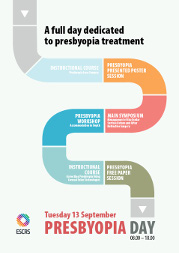Posters
Postoperative complications after penetrating keratoplasty
Poster Details
First Author: M. Zemba ROMANIA
Co Author(s): A. Stamate M. Burcea
Abstract Details
Purpose:
To assess the rate of complications after penetrating keratoplasty (PK).
Setting:
Department of Ophthalmology, “Dr. Carol Davila” Central Military Emergency University Hospital, Bucharest, Romania
Methods:
This was a retrospective study. The first 112 cases performed by the same surgeon between 2002 and 2014 were included. The follow-up period was 2 years after the surgery, monthly in the first year, then at 3-month intervals in the second year. Of the 112 cases, only100 cases had complete follow-up. The surgical tehnique involved: donor button 0.25 mm larger in diameter than the diameter of the host opening, manual or vacuum trephination, fixation with 10-0 monofilament nylon: 8 interrupted sutures removed 3-4 months after the surgery and a continuous running suture removed 1-2 years after the surgery.
Results:
The rate of complications after PK was as follows: early graft opacification (1 case), persistent epithelial defect (3 cases), early postoperative high intraocular pressure (13 cases), astigmatism: 6 months postoperative: more than 3 diopters (58 cases), more than 6 diopters (18 cases), 2 years postoperative: more than 3 diopters (24 cases), more than 6 diopters (11 cases), glaucoma (14 cases), graft rejection (44 cases), graft rejection with graft failure (21 cases), late graft failure (18 cases), infectious keratitis (9 cases), posttraumatic wound dehiscence (1 case), retrocorneal membrane (1 case) and cataract (6 cases).
Conclusions:
PK is a type or surgery associated with a high rate of complications in comparison with other types of ocular surgeries. In our study, the complications were even higher than in others, mainly due to the fact that these were the first cases of PK performed by the surgeon, but most importantly, because many of the cases included in the study had a poor prognosis to begin with: pseudophakic and aphakic bullous keratopathy, graft failure and herpetic keratitis.
Financial Disclosure:
NONE





